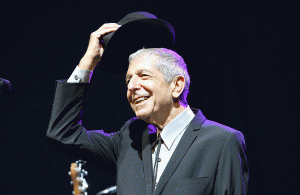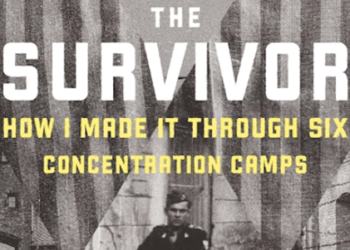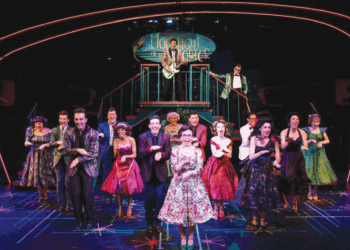By MORDECAI SPECKTOR
You don’t know me from the wind / you never will, you never did
I’m the little Jew who wrote the Bible
I’ve seen the nations rise and fall / I’ve heard their stories, heard them all
but love’s the only engine of survival
— “The Future” by Leonard Cohen
I read a review in the New York Times last week of a concert by the legendary French singer Charles Aznavour. I didn’t know that Aznavour was still alive; but the writer noted that the 85-year singer performed with the energy of a person 30 years younger.
The same cannot be said exactly of Leonard Cohen, 74, who performed Sunday night to a packed house at the Orpheum Theatre in downtown Minneapolis; but, in a much-anticipated return to the North Country, he certainly exceeded the high expectations of his local fans. Cohen alternately enthralled and energized the crowd, rewarding the devotion of both aging hardcore Cohenphiles and the Gen Xers and Millennials, who will be eating Mac and Cheese for the next few weeks after splurging on pricey concert tickets.
It was a sensational and emotionally moving show by the troubadour from Montreal, who was backed by a talented cast of musicians and three sweet female back-up singers. With two days rest after performances in his native Canada, Cohen was brimming with energy, literally skipping on and off the stage.

Addressing the jubilant crowd, the laconic singer-songwriter reminded the crowd of his last appearance in Minneapolis, in 1993, when he was 60 years old — “just a kid with a crazy dream.” (This is part of the shtick he does at every show on the current tour — it can be heard on his new album, Live in London).
Cohen also modified the lyrics to “Hallelujah” (2.13.08 AJW) on Sunday night, to acknowledge the local venue: “I did my best, it wasn’t much / I couldn’t feel, so I tried to touch / I’ve told the truth, I didn’t come to Minneapolis to fool you.”
Speaking of “Hallelujah,” which has been covered by a diverse assortment of pop stars (Jeff Buckley, k.d. lang — even dread-locked Jason Castro from American Idol), Cohen’s songs are replete with Jewish and biblical references. “Who By Fire,” for example, is straight out of the Yom Kippur liturgy, with some contemporary updates (“And who in her lonely slip, who by barbiturate”). Beyond the so-Jewish expressions of struggling with the absence or presence of God (and women), even the logo for Cohen’s current global tour is a variation on the Star of David, formed of two hearts.
Cohen — a poet, novelist and songwriter — is a storied figure in popular music. He drew on his remarkable catalog of tunes in concert. The show began with “Dance Me to the End of Love,” and the first set included “The Future,” “Bird on the Wire,” “Chelsea Hotel #2,” “Everybody Knows,” “Waiting for the Miracle,” among others. After intermission, Cohen and company launched into “Tower of Song,” which was followed by “Suzanne,” and one of many standing ovations. “Boogie Street” was sung by Sharon Robinson (who also co-wrote several songs with Cohen, including “Everybody Knows” and “Waiting for the Miracle”), one of the three back-up singers. She has a lovely, expressive voice.
The second set wound through “Hallelujah,” “I’m Your Man,” a poetic reading of “A Thousand Kisses Deep,” and “Take This Waltz.”
The poet and his band returned for several encores, the first kicked off by “So Long, Marianne,” “First We Take Manhattan,” “Famous Blue Raincoat,” and “If It Be Your Will,” which was sung by Charley and Hattie Webb (“the sublime Webb sisters,” as Cohen called them).
When it seemed that the crowd would stand and applaud until the concert extended into a fifth hour, Cohen sang the opening line of “I Tried To Leave You,” which brought forth laughter.
The backing musicians, who were directed by Roscoe Beck, an Austin, Texas-based journeyman on upright and electric bass, included Bob Metzger, guitar; Neil Larsen, keyboards; Javier Mas, bandurria, laud, archilaud and 12-string guitar; Rafael Gayol, drums; and Dino Soldo, reeds and harmonica.
As far as stage ethos, Cohen, in a slate gray suit and snap-brim fedora, exuded courtliness and graciousness; he introduced each band member during the first set, and again after the intermission. In his final remarks, he thanked the technical crew, the truck drivers, the caterers, the women backstage who handle the musicians’ hats — and bestowed thanks and blessings on his fans.
In short, the man who has labored so long in the Tower of Song uplifted the crowd and created a spirit of shared humanity that is rarely experienced in a concert hall. Cohen pointed out that we are fortunate, in a world plagued by war and poverty, to be able to gather together and share some moments of music.




















